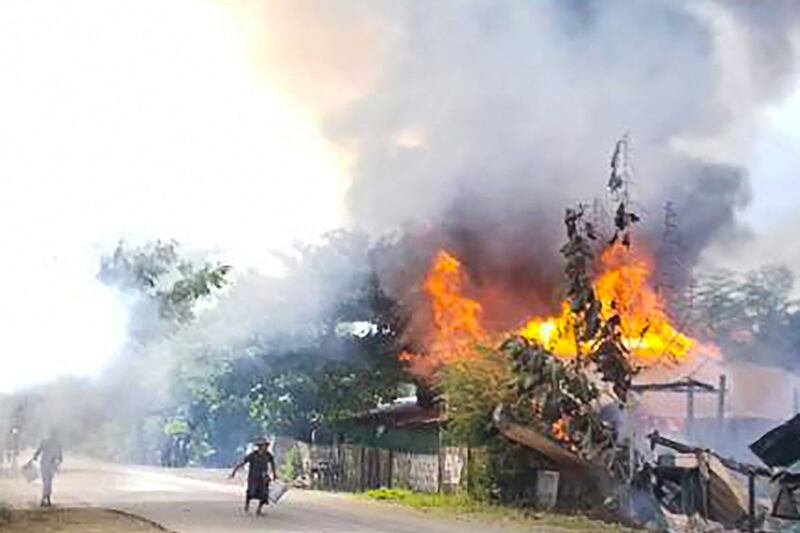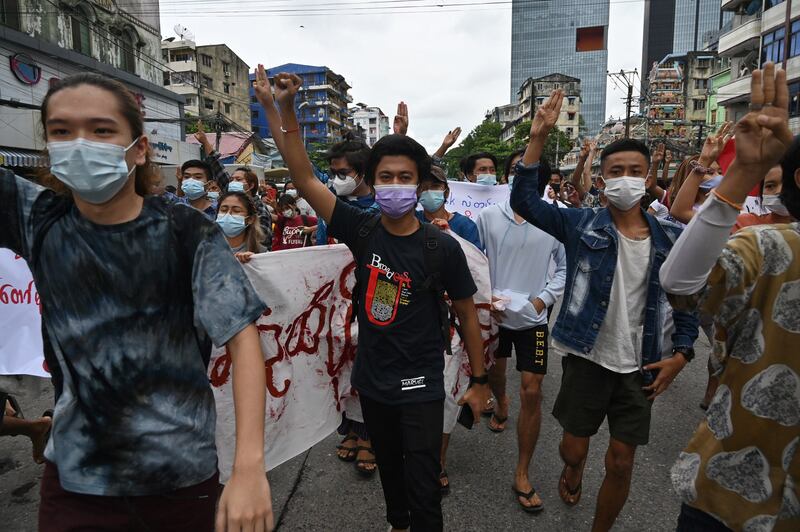Myanmar’s junta has destroyed the country’s economy, education, health, and social protection systems and led it to the brink of collapse, the United Nations said Thursday in a report detailing a litany of rights violations by the military that could amount to war crimes and crimes against humanity.
The report, compiled by the Office of U.N. High Commissioner for Human Rights (OHCHR) and, documents how security forces have killed, imprisoned, tortured and denied various rights to the people of Myanmar from the military’s Feb. 1 coup d’état until mid-July, and is based on interviews with more than 70 victims and witnesses.
"The coup has evolved into a human rights catastrophe that shows no signs of abating," the OHCHR said in its report, released for the 48th regular session of the U.N. Human Rights Council taking place from Sept. 13 to Oct. 8.
“For this reason, the international accountability efforts that have been supported by the Human Rights Council must be pursued and enhanced … Member States must act urgently to prevent a further disintegration of Myanmar into a nationwide armed conflict or state collapse.”
In a statement accompanying the report, U.N. High Commissioner for Human Rights Michelle Bachelet called on the international community, including the 11-member Association of Southeast Asian Nations (ASEAN), to ensure that the situation does not spiral out of control.
“There is no sign of any efforts by the military authorities to stop these violations nor implement previous recommendations to tackle impunity and security sector reform,” she said.
“This underscores the urgent need for strong accountability measures. It also runs in the face of commitments made to ASEAN leaders to cease the violence and begin a constructive dialogue among all parties.”
Myanmar’s military has attempted to justify its overthrow of the democratically elected National League for Democracy (NLD) government by claiming the party had stolen the country’s November 2020 ballot through voter fraud.
The junta has yet to provide evidence of its claims and has violently repressed anti-coup protests, killing at least 1,121 people and arresting 6,718 others, according to the Bangkok-based Assistance Association for Political Prisoners (AAPP).
In April ASEAN leaders agreed to a “five-point consensus” that would see the junta end violence in the country and enter into dialogue to find a peaceful solution to the country’s political crisis, however few measures have been implemented and the military has instead ramped up a crackdown on its opponents.

Litany of abuses
The U.N. report documented at least 50 detention-related deaths up to mid-July and spoke with family members who—if permitted to see the bodies of their loved ones prior to disposal—reported visible signs of injuries to victims, including bruising, broken noses and ribs, head injuries, sewn-up incisions, and burn marks. In many cases, families received no information about medical examinations or investigations into causes of death.
Children have been subject to arbitrary detention and processed through military interrogation centers, the U.N. said, while also allegedly subjected to torture and ill-treatment in custody.
The report said that the military’s “four cuts” strategy of cutting off its enemies’ access to funding, food, intelligence and recruits violates “a range of human rights as well as international humanitarian law” in certain situations, including by launching punitive reprisals against communities following skirmishes with People’s Defense Force (PDF) militias or during searches, which led to killings or injuries and forced displacement.
In one example, in late May, the military responded to the takeover of several police stations and bases by a joint force of PDFs and ethnic armed organizations (EAOs) in Kayah state and southern Shan state with heavy weapons and airstrikes in populated areas, resulting in more than 55 reported civilian deaths. Remains found after fighting subsided in June included 22 bodies exhibiting signs of execution, the report said.
The U.N. also documented a rise in criminality, targeted killings and use of explosive devices by unidentified actors between February and July, including more than 130 deaths from shootings and stabbings since May alone. It said a majority of those targeted were said to have been current or former area administrators or suspected military informants.
The junta’s actions have taken place against the backdrop of a decimated healthcare sector struggling with a deadly outbreak of COVID-19 that has killed 17,266 people and infected nearly 452,000, as well as a growing loss of investor confidence that has crushed the country’s economy.
The U.N. found that by April, around 200,000 garment workers—predominantly women—had reportedly lost employment, as did as many as 400,000 construction workers.
Health facilities, personnel, transport, and supplies have been subject to direct attacks by security forces, the report said, with the World Health Organization (WHO) recording 248 incidents between Feb. 1 and the end of June.
The report concludes that the numerous human rights violations and abuses, as well as violations of international humanitarian law, “may amount to war crimes … [and] crimes against humanity.”
“The national consequences are terrible and tragic—the regional consequences could also be profound,” Bachelet said of the report’s findings.
“The international community must redouble its efforts to restore democracy and prevent wider conflict before it is too late.”
Attempts by RFA’s Myanmar Service to contact the office of the junta’s spokesperson for comment on the report’s findings went unanswered Thursday.

Tougher approach taken
Aung Myo Min, the NUG’s Human Rights Minister, applauded what he said was a much tougher approach by the U.N. to hold the junta accountable for its actions.
“This time, her report covered more serious crimes, such as crimes committed during the armed conflicts and human rights violations such as extrajudicial killings,” he told RFA.
In July, Bachelet had called for international pressure to end the violence in Myanmar, but her office did not equate the rights violations in the country to war crimes and crimes against humanity.
Phil Robertson, deputy Asia director for New York-based Human Rights Watch, told RFA that the report made it “quite clear” that “crimes against humanity are taking place again in Myanmar and that ultimately the situation is sliding backwards to a worst-case scenario.”
“They're finding not only that there’s excessive use of force and deadly force against protesters but also systematic use of torture and abuses. And she is trying to sound the alarm to the international community to say, ‘look, something has to stop here’ … because the situation is so bad in Myanmar that we are now facing a human rights crisis of major proportions.”
While Western countries, including the U.S., have leveled sanctions against the junta for its actions, observers have called for stronger measures, such as an arms embargo.
Robertson said the report now puts the onus on the international community to move forward with “comprehensive sanctions” and other actions he said would force the junta to end its repression of the people of Myanmar.
“We do need them to redouble efforts,” he said.
“That is quite clear, and she is making the correct call by demanding that the big question is whether the international community will do so.”
Reported by RFA’s Myanmar Service. Translated by Kyaw Min Htun. Written in English by Joshua Lipes.
